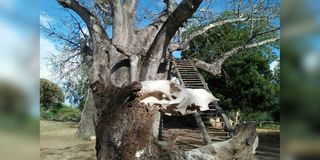Premium
End of an era: Floods uproot 800-year-old Mekatilili baobab tree
Residents of Sabaki, Malindi Sub County in Kilifi County are counting their losses after an iconic 800-year-old baobab tree, named after pre-independence heroine Mekatilili wa Menza, was swept away by floods in the Sabaki River.
The giant 800-year-old tree was a source of livelihood for more than 50 local youths who would take tourists on a tree-climbing experience and show them where the iconic Mekatilili wa Menza was said to have hidden when the colonialists arrived.
It is believed that the Iron Lady, as Wa Menza is often called in Mijikenda folklore, prophesied the coming of the Europeans, telling the people of the time that the whites would come with an iron snake, referring to the railway line.
The tree also served as a sacred place for the Mijikenda community, with locals claiming that it dates back to the time of the Mijikenda heroine Mekatilili Menza, who used to rest under the tree during her missions.
Tourists mourn
Even tourists were not spared when they woke up to news of the tragic loss of the ancient tree.
A local youth group used the area around the tree as their economic livelihood.
Mr Moses Kaingu, the leader of the group, said they had lost their livelihood, adding that they feared tourists would move to other areas, depriving them of income.
"The tourists come here to learn the history of Mekatilili wa Menza who used this place as a hideout to escape the colonialists when she was a rebel.
"The tree was uprooted by the fast-flowing water and to our shock it did not fall but just floated on the raging water until it reached the Sabaki Bridge where it became entangled in electricity cables which forced it to fall," he said.

Mekatilili wa Menza's final home. She bore through the tree and made for herself a room inside.
He added that the remaining smaller baobab tree was also in danger of being swept away as the water continued to rise.
Mr Amani Karisa, a resident, said they had lost property when part of the restaurant was swept away and appealed to the government to help them get their lives back on track.
Pamela Shaw, a tourist from South Africa, said she and her husband Bever Shaw had been visiting the sites for 12 years.
She said it was sad that the floods had wiped out history.
“I have been a frequent visitor to this site and when I heard that it had been swept away, I was devastated. It’s very sad for the community too it’s a great loss I used to visit here very often and I have always brought all my friends to visit here,” she said.
Mr Shaw said he had learned that the tree was very important to the spiritual wellbeing of the people living around it, and that was the only reason he was visiting the site.
“Whenever I came visiting I could find people worshipping around here and the tree has a very significant spiritual notion to the Girama community,” he said.
Mr Edward Kazungu Hawerisa, a Giriama Kaya elder, said the community had lost a rich historical and spiritual site that served as their meeting place with God.
“As the Mijikenda community, we have been hit hard by losing this sacred tree. This was a place we used to worship and seek God’s guidance during the good and bad times,” he said.
He added that he had also lost his livelihood, as he used to teach university students about the historical background of the Mijikenda community under the baobab tree.

Root of the iconic 800-year-old baobab tree named after pre-independence heroine, Mekatilili wa Menza swept away by floods in river Sabaki.
Environmentalist Dominic Kene, who runs Camp Gedeng, said 700 trees had been swept into the sea and called on the government to consider pulling them out of the river so they could be planted.
“Many youths about 50 were doing tourism activities here and now all of them have become jobless, “he said adding that they would protect the tree where it is until they get help to replant it.
He called on CS Alfred Mutua to intervene and allocate funds to replant the tree so as to help the community.





